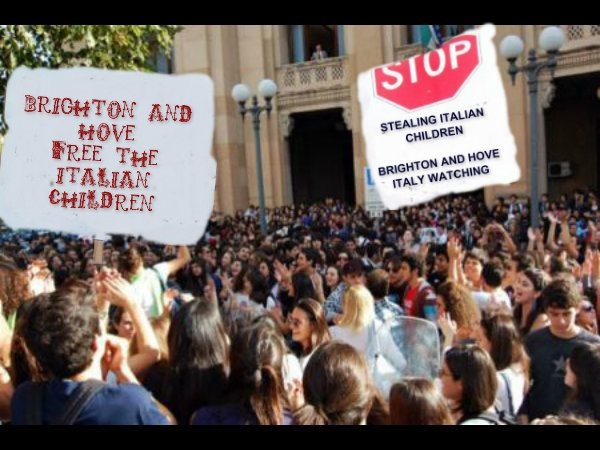what should you do if social services steal your children?.
what should you do if social services steal your children?
An attempt to give some practical advice
I was reading this blog post at the always excellent Not So Big Society
http://notsobigsociety.wordpress.com/2012/07/24/child-stealing-conspiracy-theory-codswallop/
involving an unfortunate father who had his children removed and has reacted to this by constructing a case against Leeds City Council for genocide, which has been struck out and is now awaiting an appeal in the High Court against that striking out.
I think one can never, ever, underestimate what a profoundly awful experience having a bad time with Social Services must be. There is very little (possibly nothing, now that capital punishment no longer exists in this country) that the law can do to you that is worse than taking your children away. And for that reason, whilst people like this are wrong and misguided, I can see why they are driven to these awful pieces of decision-making.
I’ll make no bones about it – I’m a lawyer for social workers, and I present cases in which sometimes social workers have to be asking for children to be removed and placed in care.
Sometimes, hopefully rarely, that’s the wrong thing to do. Sometimes, it is unequivocally the right thing to do. But almost universally, and far dwarfing those ‘definitely right’ or ‘definitely wrong’ cases, it is very sad.
It’s certainly not done to spite the parent, or for money, or to meet targets, or any of the other conspiracy theories; ultimately it is because a professional who is responsible in law for keeping that child safe reaches a point where they no longer feel that they can keep the child safe at home.
And you won’t believe it, but it honestly is the hope of social workers and people like me, in all but the very worst cases, that going to Court will bring about a change that will let us send the children home.
That doesn’t help, if it is your child. I understand that.
But I’m sure that what you want, if your child has been taken off you, is to get your child back. All of the Freeman of the Land, and your law doesn’t apply to me, and all social workers are wan*ers, and shouting the odds, really, really don’t get your child back. The success rates of all of those people who nod at Christopher Brooker’s columns and tell other parents how to fight the system is really very poor, honestly.
Other than factual determination cases, where there’s something that looks like a deliberate or non-accidental injury and the Court looks into it carefully and finds out it isn’t, in eighteen years of child protection work, I have NEVER seen a case where a parent is told by the Court, you can keep your child and you need never speak to a social worker again.
If you’re going to get your child back, social workers are going to be a part of your life. So making social workers frightened of you, or not being able to work with you, or think that you’re a liar or unstable, isn’t going to help.
That’s not to say that you have to like them – or even be terribly nice to them. Your best approach is “I know you’ve got a job to do, and I don’t like that you doing it has hurt my family, but I also know that I’ve got to show you that I can care for my children”
I’ve seen an awful lot of websites out there giving really really bad advice to parents in care proceedings, so I thought I’d have a crack at redressing the balance.
Here are some brief, practical, non “I’ll sue you for genocide” suggestions. Nobody can guarantee success in care proceedings, but you can make the central principle that the Court works to get children back home if at all possible work for you. Nothing I’m suggesting here is beyond you, if you try and you ask for help when you need it. It isn’t a guaranteed recipe of success, that’s up to you, but it certainly improves your chances.
1. Work out a way of dealing with your social worker without shouting at them. I represented parents for a few years, and what I always told them was “you can call the social worker whatever you want in your bathroom, where nobody can hear you, but don’t say that stuff to the children, or the contact supervisors, or the social worker” – don’t make it hard to be liked. Being likeable doesn’t mean being a doormat, but being likeable is something you shouldn’t underestimate. It’s like chemistry.
2. All care proceedings are about giving something up. It’s unavoidable. If you hope to go into that final hearing and talk the Court into you letting you look after the children in exactly the same way as you’ve always done, you’re going to lose. Whether it is giving up drugs, alcohol, a relationship with someone violent, smacking the children, not doing housework, sleeping till two pm, you’re going to have to give up something. Nearly all the time in court proceedings is spent with people either not accepting that they have to give something up, or pretending that they have given it up and catching them out.
If, instead, you approach it with the idea that “I want to change so that my children will be happier or better looked after with me than they were” and try to change, you’re already in the top 5% of parents in care proceedings by that one simple decision. And if you ask for help, and listen to the advice, you’re moving towards the top 2%. Which means, when the Court is listening to your case, they are thinking “this mum/dad is so much better than the people we normally see”
3. Everyone makes mistakes. Honestly, everyone. When you make one, admit it and say that you want to learn from it, to do better in the future. Giving up things you’ve done for years isn’t easy, and you’re entitled to get help with that, and you’re allowed to say that some days it is hard, and some days you might need a bit more help than usual.
4. Turn up to all the contacts – or at least, don’t miss contact unless you really have to, and tell people when you’re not going to come. When you’re at the contact, don’t be nasty about the foster carers to the children – the children need to know that even though you love them, it is okay for them to be with the foster carers and to like them and have a nice time. If you can take something to contact that will be fun for the children, that goes down well. Don’t take loads of sweets and presents, some paper and crayons and spending time with the children works wonders. Get down on the floor and play with them. Don’t promise the children bikes, or ponies, or x-boxes when they come home. Don’t ask them to say that they love you and want to come home.
5. Nothing says “I’m a paranoid oddball who can’t be trusted” more than tape-recording every interaction you have. It won’t be evidence anyway, and nobody will ever want to hear it. The only thing it does, is make everyone worry that you’re strange.
6. Get a good lawyer, and stay in touch with them. There’s a balance, of course, between ringing them five times a day, and not talking to them for months at an end and not bothering to tell them that you’re back with so-and-so and pregnant. If you tell them what’s happening, or particularly if you’re feeling like you might be about to make a big decision and you’re not sure if it is the right thing to do, they’ll be able to help you. If they ask you to come in and see them, turn up. If they advise you to do something, it’s not because they’re mean, or nasty, it’s because they want to have the best possible chance at final hearing in getting you your children back. Give them some help.
Don’t believe any of the conspiracy nonsense that all parent lawyers are pawns of the Local Authority, or lazy or crooked; some of them are smart, some are hardworking, some are inspirational, some work wonders – but no parent lawyer is ever, ever in the pocket of the Local Authority or doesn’t care about doing their best for you.
















You must be logged in to post a comment.